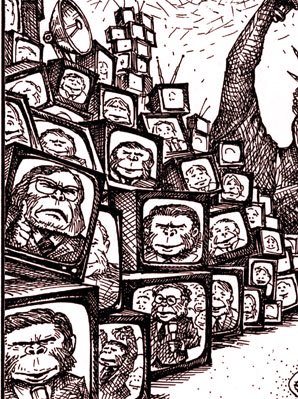
Donald Trump's presidential candidacy caught, well, everyone off guard. But no one was more flat-footed than cable TV.
On the one hand, Trump was a fringe candidate who was broadly considered to have almost zero chance of becoming anything other than that. On the other, he was a national and international celebrity who attracted eyeballs in a way no other politician could come close to. Ratings won out. Trump's speeches were broadcast live in their entirety for much of the early primary season even as his rivals complained about the inequities in coverage.
Trump surged. He won. He became president. People -- to my mind somewhat unfairly -- laid much of Trump's success at the feet of a pliant cable TV world who, they insisted, had "created" Trump. (By that logic, of course, conservative voters take their marching orders from the likes of CNN and MSNBC, which seems to me, um, unlikely.)
If candidate Trump caught cable by surprise and without a plan, however, President Donald Trump has not. In fact, I would argue that cable TV is as good or better than it's ever been; it's in the midst of a renaissance not only occasioned by Trump's rise but also forced by it.
(Caveat emptor: I am a paid MSNBC political analyst.)
What we know about the current occupant of the White House is that he watches lots and lots of cable television. In fact, he appears to get much of the fodder for his tweets from segments he sees on cable.
This sort of thing happens almost daily now. In fact, there's now a whole sub-genre of journalism dedicated to sniffing out what the cable TV antecedent is to each of Trump's tweets. No president has ever watched more TV -- and cable TV in particular -- than Trump.
Given that it is the president's preferred medium through which to not only gather information but also formulate his thoughts on various subjects, the burden on cable TV is massive. Everyone -- both journalists and the ever-growing number of politically-interested people -- are flocking to cable to see how what is influencing Trump.
That's a lot of responsibility. And the mentality of cable TV executives even a few years ago would have not been able to meet the challenge. But Trump forced a change in that mentality.
Rather than simply taking the "Candidate X says this, Candidate Y says the exact opposite" approach to the news, the last months have seen cable anchors -- with backing from management -- taking on a far more important role: Contextualizing, fact-checking and analysis.
No longer are claims simply repeated without proper context. No longer are political operatives allowed to simply spin falsehoods because "it's their opinion." Cable TV has moved from passive transference of news to active engagement with both the newsmakers and the audience.
Access for the sake of access is now rightly seen as a fool's errand.
There are a lot of anchors doing this well. CNN's Jake Tapper is at the front of that pack. Stelter, too, has become a very important voice. NBC's Chuck Todd and MSNBC's Joe Scarborough. Fox News's Shepard Smith and Chris Wallace. CBS's John Dickerson.
(Sidebar: Megyn Kelly in the early days of 2016 set the stage, in many ways, for this new dynamic in cable.)
All of these people understand that, at root, the value they bring for viewers is their knowledge and perspective. Anyone can pass along what some politician said.
Fewer people can tell you why it matters or why it's wrong or what it will mean in the next day, week or month.
Thankfully, cable TV executives seem to get the unique challenge and opportunity that Trump presents their business. More people who can tell you the "so what" and the "now what" are put on air; less people who just read the "what" with an uncritical eye are being put forward.
This moment has the potential to be a second golden age for cable TV. (The first one was in the early to mid 1990s.) The first month of Trump's presidency suggests cable TV executives grasp the gravity of the moment and their need to adapt or die.


 Contact The Editor
Contact The Editor
 Articles By This Author
Articles By This Author